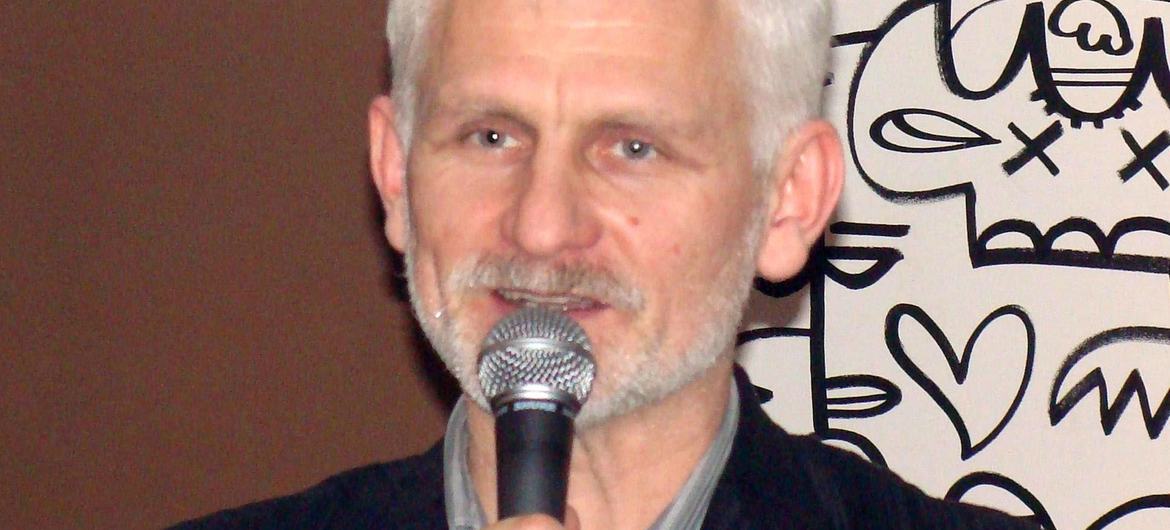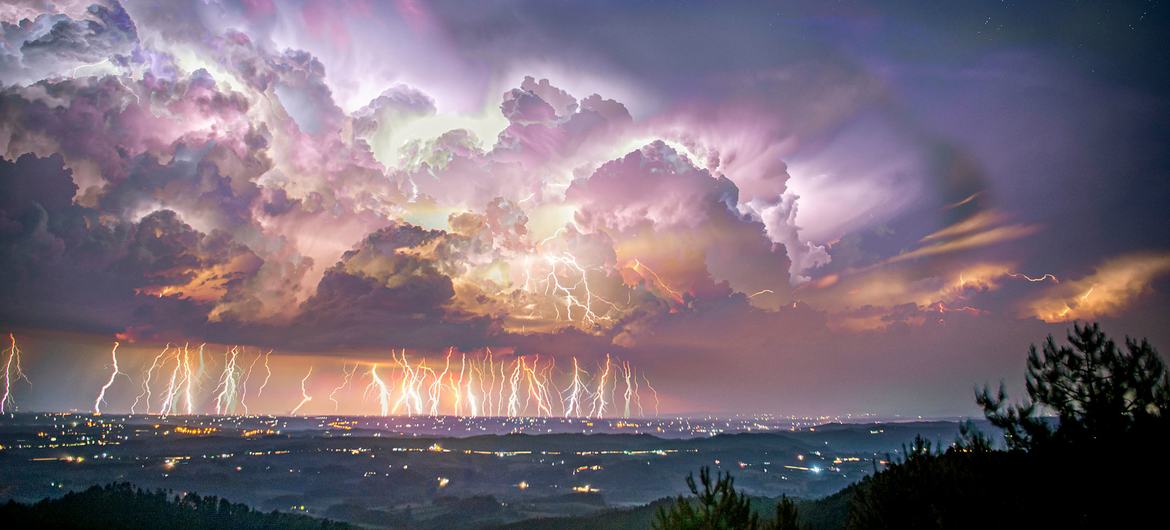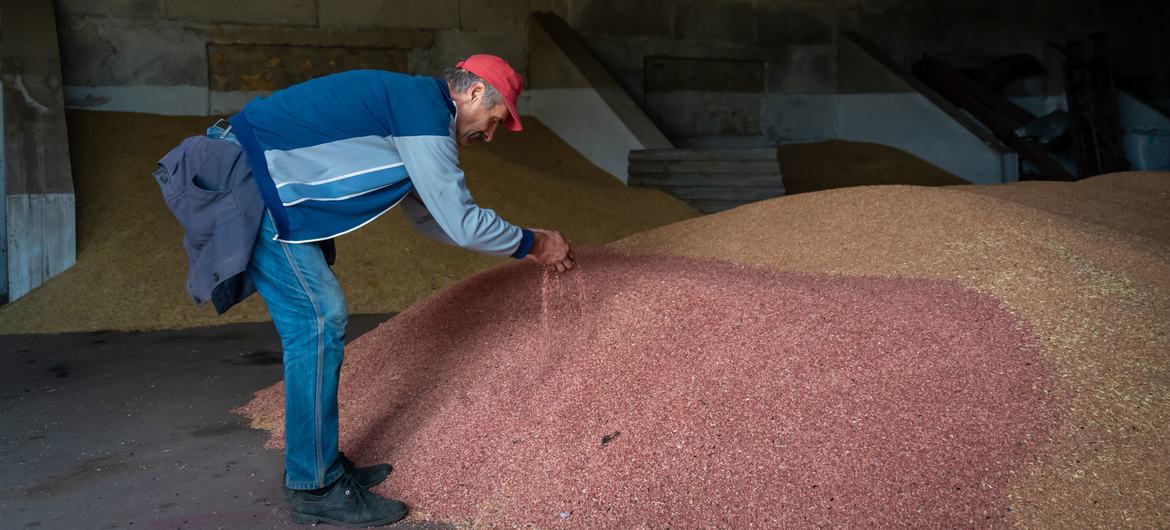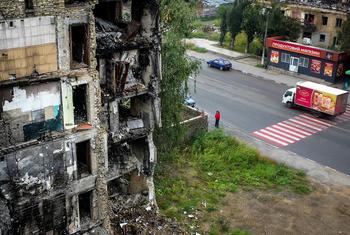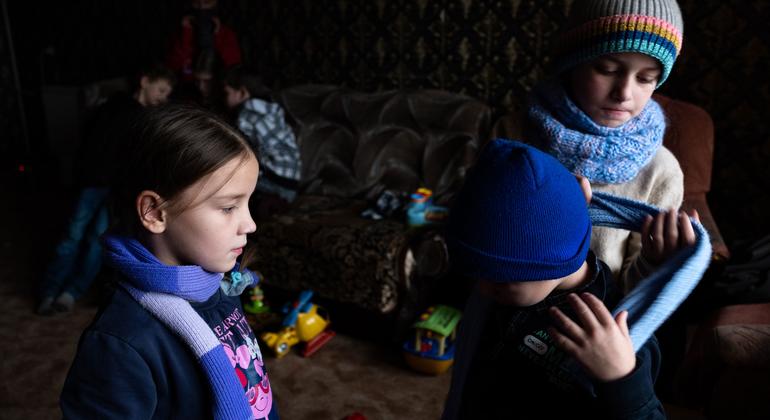
Ukraine: ‘Multiple civilian causalities’ as new year dawns
Citing UN humanitarian colleagues, he informed the media at the regular daily press briefing that intensified violence in different regions of the war-torn country caused “multiple civilian casualties”, which included children and journalists. “Ukrainian authorities reported more than 50 civilian casualties on December 31st alone”, […]
HQ Report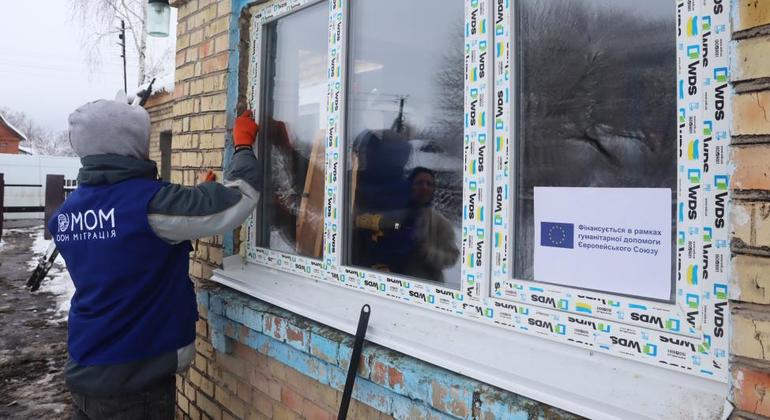
UN migration agency to support 700,000 Ukrainians through ‘most challenging’ winter
Humanitarian funding from the European Union (EU), is enabling the International Organization for Migration (IOM) to support over 700,000 Ukrainians with multi-sectoral assistance this winter, which is set to be “the most challenging season yet for the country”. “Displaced and war-affected people will face new and growing challenges […]
HQ Report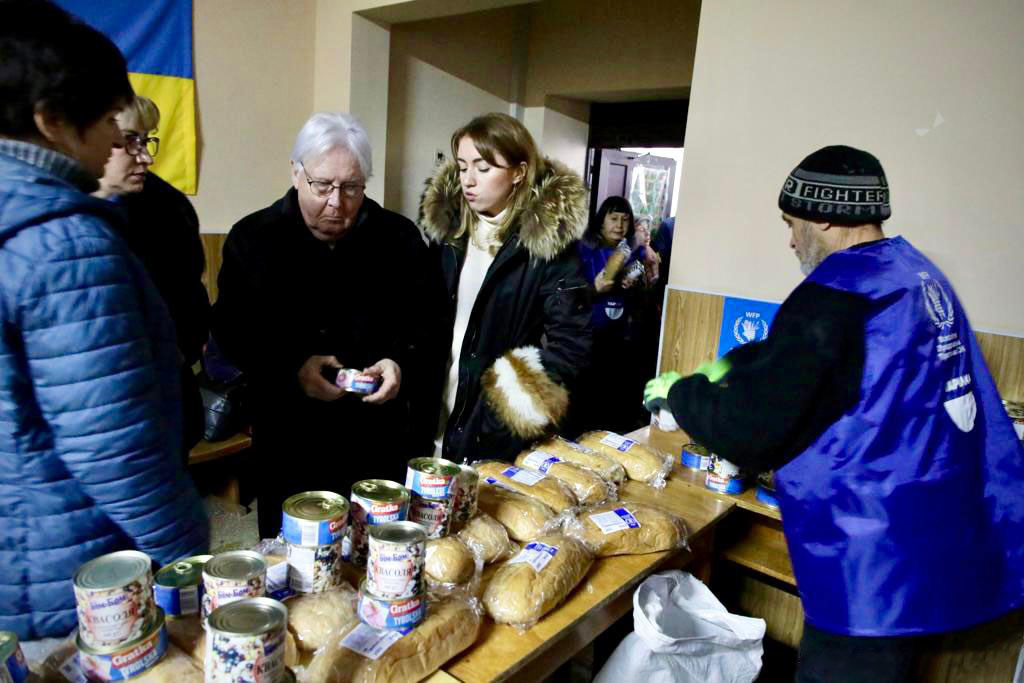
UN emergency relief chief ends Ukraine visit, pledging solidarity
Speaking in Kyiv, at the end of a four-day official visit, Martin Griffiths described the deadly threat from daily artillery attacks on the southern port city of Kherson. Today, more than 18 million people in Ukraine need humanitarian aid, according to UN humanitarians. Some 7.83 […]
HQ Report

UN taps potential for trust-building on shared water resources
“This year’s terrible floods and droughts in almost all corners of the planet illustrate the critical importance of water to all aspects of society and the environment,” said the UN Economic Commission for Europe (UNECE), which includes 56 member States in Europe, North America and […]
HQ Report
“This year’s terrible floods and droughts in almost all corners of the planet illustrate the critical importance of water to all aspects of society and the environment,” said the UN Economic Commission for Europe (UNECE), which includes 56 member States in Europe, North America and Asia.
“More than three billion people depend on water that crosses national borders. This makes transboundary water cooperation a crucial foundation for peace, sustainable development and climate action,” insisted UNECE Executive Secretary, Olga Algayerova, at the launch of the Transboundary Water Cooperation Coalition, during the UN-Water Groundwater Summit in Paris.
The decision to form the Coalition comes ahead of the second UN Water Conference, from 22 to 24 March 2023. Equitable water management and security is high on the list of the UN’s priorities as a means of preventing conflict, and it is also a Sustainable Development Goal.
Pooling resources
Myriad interested parties are set to join forces in addition to governments and intergovernmental organizations, UNECE explained, from regional integration organizations to international financial and academic institutions, along with civil society groups.
The UN body also noted that although 153 countries share transboundary rivers, lakes or aquifer basins, only 24 have all of their transboundary basins covered by operational arrangements.
Conference call
Echoing the UNECE chief’s call for more countries to commit to joining the Water Convention at next year’s UN Water Conference, Senegal’s Serigne Mbaye Thiam insisted that transboundary cooperation on water was critical to peace, development and resisting climate shocks.
“We need to act promptly and without delay, especially in transboundary basins and aquifers, which are often most vulnerable to the impacts of climate change,” said Senegal’s Minister of Water and Sanitation. “As a member of the Coalition, we urge governments and stakeholders to make concrete commitments to improve transboundary cooperation at the 2023 Water Conference.”
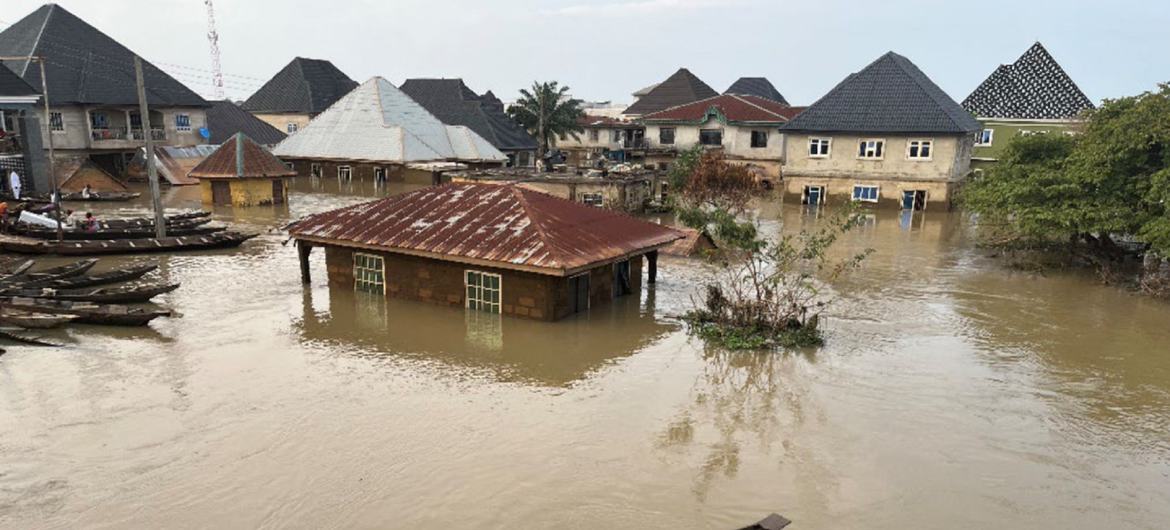
OCHA/ Trond Jensen
A flooded area of Anambra State, Nigeria on 28 October, 2022
Slovenia’s Minister of Foreign Affairs, Tanja Fajon, who described her country as a “cheerleader” for cooperation on water, insisted that it played a key role in promoting regional peace and security. “Transboundary water cooperation is about management of shared water resources, shared interests, constructive reciprocity and building trust,” she explained.
No water, no development
From the World Bank, Saroj Kumar Jha, Global Director for Water Global Practice, said that improved cooperation over shared water was “a prerequisite for development…the advancement of climate change agenda and the demands of growing population, balancing the needs of people and the environment”.
UNECE’s Ms. Algayerova noted that the objectives of the new Coalition should focus on strengthening the legal and institutional frameworks that govern water, enhancing capacity, sharing data, increasing financing and sharing knowledge.
According to the Swiss government – a key supporter of defusing potential conflicts through water diplomacy, an approach known as Blue Peace – no less than 263 catchment basins of rivers or lakes extend over two or more countries worldwide.

Ukraine’s suffering must not become new normal, declares UN rights chief
Speaking in the capital, Kyiv, after an official four-day visit to the country, Volker Türk said that the scale of the damage and destruction that he had seen in Izium was “shocking”. In Bucha, north of Kyiv, where scenes showing civilians lying dead in the […]
HQ Report
Speaking in the capital, Kyiv, after an official four-day visit to the country, Volker Türk said that the scale of the damage and destruction that he had seen in Izium was “shocking”.
In Bucha, north of Kyiv, where scenes showing civilians lying dead in the street sparked international outrage soon after the departure from the area of Russian forces in March, Mr. Turk said that people’s trauma “remains palpable”.
‘Very worrying’ future
He added that he feared for all those caught up in the “long, bleak winter ahead”, while also confirming that the consequences of the war on human rights in Ukraine had been devastating.
“The prognosis is very worrying,” the UN High Commissioner for Human Rights said, adding that his Office has continued to receive information about war crimes “each day”.
“Information continues to emerge about summary executions, torture, arbitrary detention, enforced disappearances and sexual violence against women, girls and men,” he noted.
The High Commissioner’s visit coincides with the release of a new report into the killings of civilians by the UN Human Rights Monitoring Mission in Ukraine.
‘Wilful’ killings
The report is expected to document the fate of 441 civilians in parts of three northern regions – Kyiv, Chernihiv and Sumy – that were under Russian control until early April.
The UN Human Rights Monitoring Mission in Ukraine is also working to corroborate allegations of additional killings in these regions, and in parts of Kharkiv and Kherson regions that were recently retaken by Ukrainian forces, Mr. Türk said.
Some were killed “cutting firewood or buying groceries”, the UN rights chief noted, adding that there were “strong indications that the summary executions documented in the report, constitute the war crime of willful killing”.
On the issue of prisoners of war, the UN rights chief insisted that they must be treated humanely “at all times”. International law allows for their prosecution only if they are suspected of war crimes, he continued.
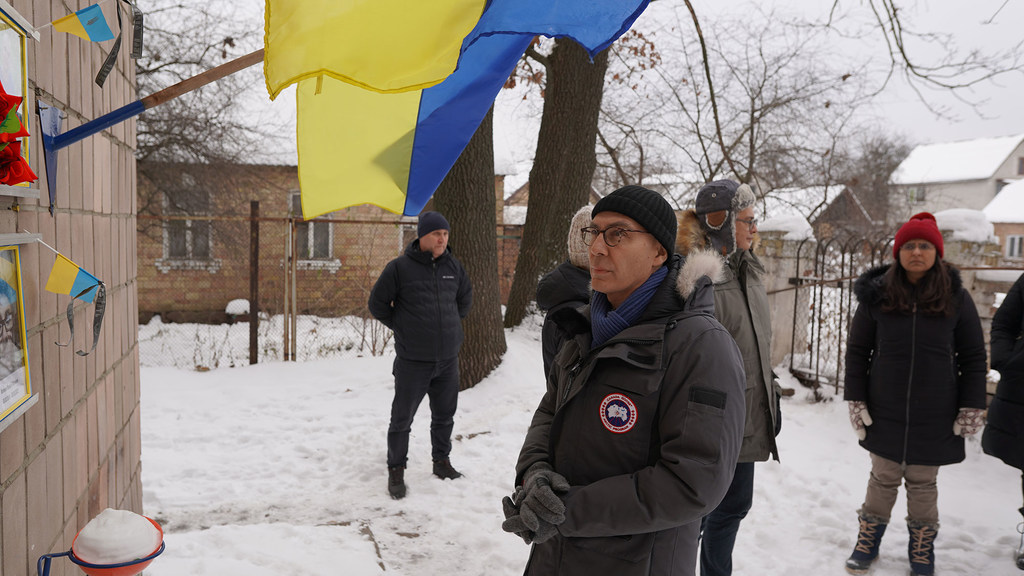
© OHCHR/Anthony Headley
UN Human Rights High Commissioner, Volker Türk, visits Bucha in Ukraine.
Dire needs are growing
As a direct result of the Russian invasion on 24 February, 17.7 million people now need humanitarian assistance and 9.3 million require food and livelihood assistance, Mr. Türk said.
He added that a third of the population has been forced to flee their homes, 7.9 million have left the country – the majority, women and children – and 6.5 million people are internally displaced.
From 24 February to 4 December 2022, the UN human rights office, OHCHR, has recorded 17,181 confirmed civilian casualties in Ukraine: 6,702 killed and 10,479 injured.
“Let me stress that the most effective way to stop the running catalogue of cruelty from continuing is to bring an end to this senseless war – in line with the UN Charter and international law,” the High Commissioner insisted. “My most fervent wish is for all people in Ukraine to enjoy the right to peace.”
Brutal deaths: UN monitoring mission
In a press release issued later on Wednesday, the head of the UN Human Rights Council-appointed monitoring mission, Matilda Bogner, said the summary executions examined in the report may constitute a war crime, noting that her team in Bucha had documented the killing of 73 civilians (54 men, 16 women, 2 boys, and 1 girl) during the reporting period, and is in the process of corroborating an additional 105 alleged killings.
Summary executions often followed security checks by Russian armed forces. “A mere text message, a piece of camouflage clothing, or a record of previous military service could have fatal consequences,” she said.
The report states that the UN has, so far, documented the violent deaths of 441 civilians (341 men, 72 women, 20 boys and 8 girls) in the three regions in the initial six weeks of the Russian invasion alone.
The report cautions the actual figures “are likely to be considerably higher” as work is still ongoing to corroborate an additional 198 killings that occurred in the Kyiv, Chernihiv, and Sumy regions occupied by Russia in the initial stages of the offensive.
Civilians were targeted on roads while moving within or between settlements, including while attempting to flee the hostilities,” Ms. Bogner said.
The report examines 100 killings in more detail. Of that number, 57 amounted to summary executions (48 men, seven women, and two boys). Thirty of those took place in places of detention while the remaining 27 victims “were killed on the spot, shortly after coming under the control of Russian forces”, the press release outlined.
“Russian soldiers brought civilians to makeshift places of detention and then executed them in captivity. Many of the victims’ bodies were found with their hands tied behind their backs and gunshot wounds to their heads,” the mission head said.
The report found that men and boys comprised 88 per cent of all victims of summary executions, suggesting that males were disproportionately targeted on the basis of their gender.
“Much needs to be done to hold those responsible to account”, according to the mission, adding that UN rights office, OHCHR, has found no information that the Russian authorities have been actively investigating or prosecuting any of the cases concerned.
Ms. Bogner called on Russian authorities to promptly investigate all alleged violations of international law and to bring those responsible to justice.

Ukraine: ‘Senseless war’ has triggered ‘colossal torment’: Griffiths to Security Council
Amidst ongoing humanitarian operations, Martin Griffiths told ambassadors he had come to brief them in New York on “the widespread death, destruction, displacement, and suffering” taking place since the invasion of 24 February, and the challenges that the continuing violence and winter weather were exacerbating. […]
HQ Report
Amidst ongoing humanitarian operations, Martin Griffiths told ambassadors he had come to brief them in New York on “the widespread death, destruction, displacement, and suffering” taking place since the invasion of 24 February, and the challenges that the continuing violence and winter weather were exacerbating.
“Over 14 million people remain forcibly displaced from their homes in Ukraine, including 6.5 million internally displaced in Ukraine, and over 7.8 million refugees recorded across Europe”, he detailed.
Health under fire
Citing the UN human rights office, OHCHR, he said that there have been 17,181 civilian casualties, with 6,702 civilians having been killed since 24 February, but “we know that the real toll is far greater”.
The World Health Organization (WHO) estimates there have been at least 715 attacks on Ukraine’s health system, including 630 that impacted health facilities and 61 affecting personnel.
“These attacks in Ukraine represent more than 70 per cent of all attacks on healthcare infrastructure reported worldwide this year”, said the UN relief chief.
Mr. Griffiths said that since 24 February, 1,148 children had been killed or injured, “while millions have fled, been uprooted from their homes, separated from their families or put at risk of violence”.
Child suffering
He became visibly choked up in the chamber, relaying that some 765,000 children have needed and received psycho-social support, to help them deal with the trauma they have gone through.
Meanwhile, mobile teams in centres for the internally displaced, are registering, assessing and providing direct support.
At the same time, gender-based violence targeting women and girls continues to be pervasive, and under-reported, he said.
As humanitarians work to respond, they are scaling up essential services, including a network of safe spaces, and delivering survivor-centered services for women, girls, boys and men, who have experienced gender-based violence.
Assault on energy grid
Amidst freezing temperatures that are expected to drop to below -20°C, attacks on the country’s energy infrastructure continue, leaving millions without access to heat, electricity, and water – “adding another dangerous dimension to the humanitarian crisis caused by the war”, said Mr. Griffiths.
These attacks deprive people of basic healthcare and children of their right to an education.
“In Ukraine today, the ability of civilians to survive is under attack”, he spelled out, reminding that the already vulnerable, such as the elderly and displaced, are at the highest risk.
Under international law, “objects indispensable to survival…must be protected…throughout all military operations”, Mr. Griffiths added.
The humanitarian community continues to stay and deliver for Ukrainians, with almost 690 partners providing life-critical aid and protection services to 13.5 million people.
Plea for international support
Working around the clock to provide vital services and supplies for the winter, they have already reached more than 630,000 civilians, providing around 400 lifesaving generators to essential facilities.
However, since October, sustained attacks on the whole energy grid by Russian forces, have created a whole new level of need, he warned.
“The scale of destruction of the electrical and heating infrastructure requires the international community’s enhanced support to the Government of Ukraine beyond what humanitarians can provide”, he warned.
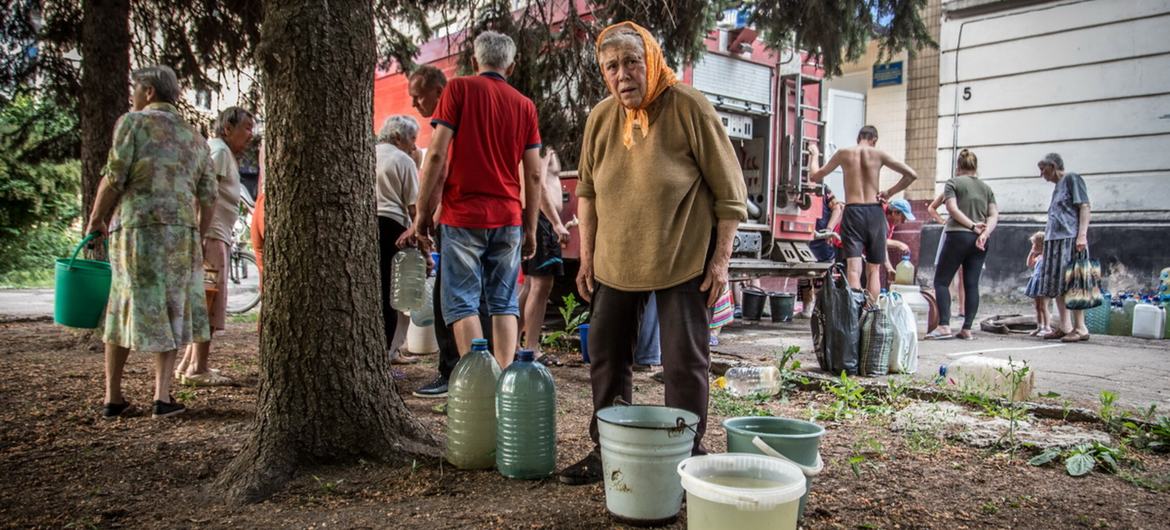
UNOCHA/Oleksandr Ratushniak
A woman collects water from a truck in Lysychanskt, Ukraine.
Donor generosity
Mr. Griffiths lauded unprecedented support from national governments and others, for the UN’s Ukraine Flash Appeal, noting receipt of $3.1 billion of the $4.3 required through the end of the year.
“To date, we have transferred almost $1 billion in humanitarian cash assistance to more than 4.3 million people”, he said.
“But more must be done to close the funding shortfall. Continued support is critical to sustain humanitarian operations through 2023”.
Accessing those in need
While acknowledging some improvements in humanitarian access, he said impediments to reaching areas in Donetsk, Luhansk, Kherson and Zaporizhzhia remain.
“It is absolutely vital that humanitarians be allowed to send personnel and inter-agency convoys to deliver relief items to all those in need, wherever they are located”, he underscored.
Of the 13.5 million people reached since February, around a million are in areas outside the Ukraine Government’s control.
“Under international humanitarian law, all parties must allow and facilitate the rapid and unimpeded passage of humanitarian relief for civilians in need and must ensure that relief personnel have the freedom of movement required for their work”, he said.
‘Spare no effort’
At the beginning of 2022, 274 million people needed humanitarian assistance. The projected number for 2023 has now grown to 339 million – a 24 per cent increase, Mr. Griffiths told ambassadors.
“It represents one in every 23 people on the planet”, he said, equating the number to a population the size of the world’s most populous country.
“We must do more to reverse this devastating trend and…redouble all efforts to prevent further escalation and end the war in Ukraine…and spare no effort for peace”.
Click here to watch the meeting in its entirety.

Ukraine: Missile strikes threaten millions facing cold and hungry winter
At the regular press briefing in New York, Associate Spokesperson Stéphanie Tremblay told journalists that according to UN humanitarian affairs office OCHA, citing local authorities, strikes affected regions in the north, centre and south, as well as the capital, Kyiv. “In Odesa, the water supply […]
HQ Report

At the regular press briefing in New York, Associate Spokesperson Stéphanie Tremblay told journalists that according to UN humanitarian affairs office OCHA, citing local authorities, strikes affected regions in the north, centre and south, as well as the capital, Kyiv.
“In Odesa, the water supply has been compromised due to the lack of electricity to run the pumps, and the heating system in Dnipro and Odesa have also been impacted”, she detailed.
“In addition, 40 per cent of the Kyiv region was left without electricity”.
Left in the cold
Ms. Tremblay said attacks have further damaged Ukraine’s power grid, “at a time when temperatures have dropped below zero in most of the country and reached -8 degrees in Kyiv”.
Repeated attacks on the energy system are putting millions of civilians at risk of freezing, particularly those living on the front lines, without access to heating, water, and essential services.
Help staying warm
Fortunately, she continued, aid workers continue to support the Ukrainian authorities with generators to keep hospitals working; centres for the displaced to keep warm; and helping prepare thousands of facilities as temporary heating points.
“We have distributed more than 400 generators, and more are arriving in the coming days”, the spokesperson continued. “We also provided warm clothes, heating appliances and home repairs for more than 630,000 people”.
And in the Kherson region, the UN has delivered another 10 truckloads of critical supplies to two communities in the outskirts of Kherson city, including health kits enough to treat 20,000 patients for three months; hygiene kits for 6,000 people; and critical household items, including blankets, mattresses, and other supplies to 1,500 families.
Feeding families
At the same time, she said that despite the challenges sparked by conflict-induced lack of basic services in the country, last month, the World Food Programme (WFP) has assisted close to 2.8 million people with food and cash support.
WFP noted that the main priority for December remains to consistently respond to the dire needs of those in the worst impacted areas through timely life-saving assistance.
“Overall, since the start of WFP operations in the country in February of this year, more than 137,000 metric tonnes of food have been delivered to partners, intended for people impacted by war and in need living across the country”, Ms Tremblay concluded.

Fighting conflict-related sexual violence in Ukraine
As the Russian invasion erodes the security of Ukrainians across the country, the risk to women and girls is two-fold. “There’s no doubt that no one feels safe because of Russia’s war against Ukraine,” says Ms. Kit, “And women and girls have become even less […]
HQ Report
As the Russian invasion erodes the security of Ukrainians across the country, the risk to women and girls is two-fold. “There’s no doubt that no one feels safe because of Russia’s war against Ukraine,” says Ms. Kit, “And women and girls have become even less protected from gender-based violence. Rape—usually gang rape—sexual torture, forced nudity, and other forms of abuse have been documented by journalists, human rights organizations and law enforcement agencies.”
The true scale of this violence is not yet known, Ms. Kit adds, but what’s clear is that its impacts will be lasting: “We will have to work with the consequences of conflict-related sexual violence for many years to come.”
At the same time, women are still contending with the endemic violence of their own society. “Cases of domestic or sexual violence against women, in particular in public places, haven’t disappeared,” she notes. “People who were abusive and violent within the family continue to commit acts of violence.”
The ongoing conflict has made progress that much harder, emphasizes Ms. Kit: “It’s difficult to move forward in the fight against violence against women when you live in a state of war and fight for your life and the lives of your children every day.”
Bridging the gaps
Starting her law career in 2007, Ms. Kit saw a critical gap in legal assistance for survivors of domestic violence. “There were not many lawyers willing to work with such cases, because these are often latent crimes,” she says. Domestic violence is typically considered a private matter, and the legal system tends to shift responsibility for handling such cases onto the victims themselves.
Ms. Kit set out to change this. “I want myself, as well as other women and girls in Ukraine, to feel safe and to know that if their rights are violated, they [will] receive effective protection, without prejudice, discrimination, or stigma,” she says.
In 2017, she took a major step towards this goal with the founding of JurFem. The organization’s recent work has been shaped by the unfolding crisis: collaborating with partners to ensure conflict-related sexual violence survivors receive protection and support from law enforcement and service providers. They’ve also been providing legal assistance directly to survivors, launching a legal aid hotline in April.
“It is possible to change our approach to investigating cases related to sexual violence only through experience and practice,” Ms. Kit says. Even the strongest legal protections can’t convince police or judges to believe a survivor. But by communicating with law enforcement agencies and the courts, “JurFem lawyers can break existing stereotypes and ensure access to justice for the victims.”
Though her own advocacy work relies on her legal training and decades of experience, Ms. Kit emphasizes that you don’t need special skills or knowledge to get involved in a cause: “Each and every one of us should work to change something for the better.”
What activism does require, she says, is community and care: “unite, enlist the support of like-minded people and forces,” she advises. “Take care of your safety and mental health and do what you feel is right, take care of yourself in order to be able to take care of others.”
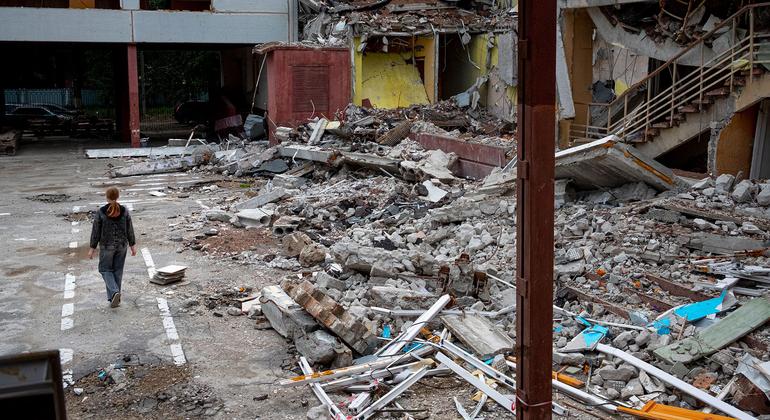
© UNICEF/Ashley Gilbertson
Never again
“Today, it’s especially hard to imagine a world without gender-based violence,” says Ms. Kit. “After all, if we weren’t able to prevent this war, would we be able to eradicate gender-based violence?”
She does believe that we can reduce its prevalence by creating better response mechanisms and bringing perpetrators to justice. And she believes in a better future for Ukrainian women and girls: “Justice must be restored,” she says, “so this never happens again.”

Ukraine: Heading into winter without heat or water, needs in Mykolaiv are ‘critical’
Updating journalists at a regular press briefing, Stéphane Dujarric recounted Humanitarian Coordinator Denise Brown’s visit over the weekend to Kherson and Mykolaiv where she assessed the humanitarian situation, met with authorities, and monitored the response provided by aid organizations. She observed that although humanitarians are […]
HQ Report

Updating journalists at a regular press briefing, Stéphane Dujarric recounted Humanitarian Coordinator Denise Brown’s visit over the weekend to Kherson and Mykolaiv where she assessed the humanitarian situation, met with authorities, and monitored the response provided by aid organizations.
She observed that although humanitarians are delivering vital aid, “the needs are immense”.
Making a difference
Ms. Brown saw first-hand how since the Government retook control of Kherson, supplies provided by the UN and partners have made a difference in the lives of people, the UN Spokesperson said.
“We expect that, with support of the authorities, we will be able to cover the basic needs of people who have stayed in the city, if we are able to sustain the same level of aid sent over the past two weeks”, he elaborated.
Mykolaiv ‘cut off’
Meanwhile, the situation in Mykolaiv remains “critical” as the city continues to receive people fleeing Kherson – a trend that began when Russia first invaded Ukraine in February.
“Since the start of the war and until recently, Mykolaiv had been shelled almost daily, leaving some 250,000 people who remained in the city completely cut off from water supply and other essential services”, Mr. Dujarric told the journalists.
“Local authorities tell us that now, with the front lines moving further from the city, they are finally able to start to repair the water system”.
Winter is coming
To help the people of Mykolaiv and those arriving from other places, donors are supporting humanitarian organizations by bolstering authorities as they prepare the city for the winter.
“Some heating points have already been established in Mykolaiv to help people who cannot heat their homes”, the Spokesperson said.
“Aid workers are providing supplies and generators to make these places functional”.
Dire situation
Although electricity is gradually being restored, water and heating supplies remain dire.
“We continue to be concerned about the plight of civilians in Ukraine especially as winter sets in”, said Mr. Dujarric, informing the media that the UN is working to “support people with services and supplies to make sure they can be protected and keep warm during these harsh months”.
He thanked donors for their “extraordinary” financial support to the Ukraine humanitarian response, saying that $3.1 billion of the $4.3 billion Flash Appeal for the year had been received.
“In order to maintain the momentum of the response and continuity of operations to support people across Ukraine over these cold winter months, continued funding is obviously critical”, he said.

Ukraine: Missile strikes, summary executions highlight importance of international law
“Millions are being plunged into extreme hardship and appalling conditions of life by these strikes”, he said. “Taken as a whole, this raises serious problems under international humanitarian law, which requires a concrete and direct military advantage for each object attacked”. Racking up casualties According […]
HQ Report

“Millions are being plunged into extreme hardship and appalling conditions of life by these strikes”, he said.
“Taken as a whole, this raises serious problems under international humanitarian law, which requires a concrete and direct military advantage for each object attacked”.
Racking up casualties
According to the UN Human Rights Monitoring Mission in Ukraine (HRMMU), on Wednesday further missile strikes in the city and region of Kyiv killed at least eight civilians, counting one girl, and injured some 45 others, including seven children.
A two-day old baby boy was killed, and two doctors injured by a rocket strike on a hospital in Vilniansk, in the Zaporizhzhia region.
Since Russia began its ongoing barrage of missile strikes and loitering munition attacks across the country on 10 October, HRMMU has verified at least 77 civilian deaths and 272 injured.
Allegations on both sides
In addition to documenting civilian casualties, the Monitoring Mission has been examining videos and other information surrounding alleged summary executions.
“Since Russia began its armed attack on Ukraine in February, there have been numerous allegations of summary executions by both parties of prisoners of war and others no longer participating in the fighting”, Mr. Türk said.
“Persons hors de combat, including soldiers who have surrendered, are protected under international humanitarian law and their summary execution constitutes a war crime”, he reminded.
‘Forensic investigations’ needed
Among some of the videos that have surfaced over the last two weeks on social media are video clips from the village of Makiivka, which show the apparent surrender of Russian forces or Russian-affiliated armed groups; a man opening fire at Ukrainian soldiers; and subsequently the dead bodies of some 12 Russian soldiers.
“Our Monitoring Mission in Ukraine has conducted a preliminary analysis indicating that these disturbing videos are highly likely to be authentic in what they show. The actual circumstances of the full sequence of events must be investigated to the fullest extent possible, and those found responsible, appropriately held to account”, said the senior UN official.
“The analysis the Mission has done to date underlines the need for independent and detailed forensic investigations to help establish exactly what happened”.
Meanwhile, the Ukrainian authorities have opened a criminal investigation into the events.
“It is essential that all allegations of summary executions are investigated fully in a manner that is – and is seen to be – independent, impartial, thorough, transparent, prompt and effective”, said Mr. Türk.
Cost of war
The UN Human Rights Chief also called on the parties to “issue clear instructions” to refrain from retaliation and reprisals against any prisoners of war and to ensure that these instructions are fully complied with.
“The rules governing armed conflict set out in the Geneva Conventions demand this. Order your troops to treat those who surrender and those they detain humanely”.
He flagged the devastating impacts of missile strikes by Russian forces and allegations of summary executions of prisoners of war as showing “all too plainly the intolerable human cost of this, and any other, armed conflict”.
“They are a stark reminder of why international law exists and why it must be fully complied with to prevent a descent into utter inhumanity and negation of the very idea of our human rights”, the High Commissioner stressed.

‘Catastrophic’ winter in store for Ukraine, warns UN peacebuilding chief, following Russian strikes on critical infrastructure
Ms. DiCarlo referred to the latest wave of Russian missile and drone strikes in Ukraine which, she said, terrorized the citizens of several cities (Kyiv, Odesa, Lviv, Mykolaiv, Kharkiv, and Zaporizhzhia). With winter approaching, the attacks, she said, “renew fears that this winter will be […]
HQ Report

Ms. DiCarlo referred to the latest wave of Russian missile and drone strikes in Ukraine which, she said, terrorized the citizens of several cities (Kyiv, Odesa, Lviv, Mykolaiv, Kharkiv, and Zaporizhzhia).
With winter approaching, the attacks, she said, “renew fears that this winter will be catastrophic for millions of Ukrainians, who face the prospect of months of frigid weather with no heating, electricity, water, or other basic utilities”.
All regions affected
The UN peacebuilding chief went on to catalogue some of the reported consequences of the most recent strikes, from the death of a new-born baby in a maternity hospital in the Zaporizhzhia region, which was hit overnight, to dozens of civilian deaths in residential buildings in Kyiv and nearby towns.
According to Ukrainian officials and media reports, the country’s energy supply has been decimated; even before the latest barrage, practically no large thermal or hydroelectric power plants were left intact. All regions of Ukraine have introduced emergency shutdowns, and several regions are reported to be completely disconnected from electricity. Neighbouring Moldova has also been adversely affected.
Humanitarian efforts to support the Ukrainian people have ramped up, said Ms. DiCarlo: more than 430,000 people have received some sort of direct winter assistance in the past weeks, and nearly 400 generators have been distributed to ensure energy in hospitals, schools, and other critical facilities.
“The United Nations strongly condemns these attacks and demands that the Russian Federation immediately cease these actions,” declared Ms. DiCarlo, calling for accountability for any violations of the laws of war, and reiterating that attacks targeting civilians and civilian infrastructure are prohibited under international humanitarian law.
“The world cannot afford a nuclear catastrophe’
Ms. DiCarlo expressed deep concern at the situation at Europe’s largest nuclear power plant, in Zaporizhzhia.
Despite reported shelling at the plant over the weekend, key equipment at the site remains intact, she said, and there are no immediate nuclear safety or security concerns.
However, she went on, “this is the result of sheer luck. We do not know how long this luck will last. The world cannot afford a nuclear catastrophe”.
The Under-Secretary-General briefed the Council that, a matter of hours before her address, the International Atomic Energy Agency (IAEA) had reported that the plant is relying on diesel generators to power cooling and essential nuclear safety functions.
Prisoner exchange
Ms. Di Carlo was able to point to one ray of light in an otherwise downbeat assessment of the situation – a prisoner exchange.
Russia and Ukraine, she said, had reported the release of 35 Russian and 36 Ukrainian prisoners. She called on both parties to continue such releases, and to ensure that they fulfil their obligations under international law, in particular, the Third Geneva Convention, which relates to the treatment of prisoners of war.
All Member States and international organizations, said Ms. DiCarlo, must support efforts to prevent a man-made humanitarian catastrophe in Ukraine this winter.
“The resulting shocks”, she concluded, “would exact a heavy price, not only on Ukrainians, but on us all.

Overnight blasts near Ukraine nuclear plant are ‘playing with fire!’ – UN nuclear chief
In a statement issued by the International Atomic Energy Agency (IAEA), Director General Rafael Mariano Grossi said that that blasts yesterday evening and again this morning further underlined “the urgent need for measures to help prevent a nuclear accident there”. “As I have said many […]
HQ Report

In a statement issued by the International Atomic Energy Agency (IAEA), Director General Rafael Mariano Grossi said that that blasts yesterday evening and again this morning further underlined “the urgent need for measures to help prevent a nuclear accident there”.
“As I have said many times before, you’re playing with fire!”.
Renewed shelling
In what appeared to be renewed shelling near and at the site of Europe’s largest nuclear power plant, IAEA experts on the ground reported that more than a dozen blasts were heard within a short period of time in the morning local time.
The IAEA team were also able to see some of the explosions from their windows.
“The news from our team yesterday and this morning is extremely disturbing”, said Mr. Grossi.
Citing information provided by plant management, the IAEA team said there had been damage to some buildings, systems, and equipment at the site, but noncritical for nuclear safety and security.
“Explosions occurred at the site of this major nuclear power plant, which is completely unacceptable”, he added. “Whoever is behind this, it must stop immediately”.
According to news reports, Russian and Ukrainian nuclear energy authorities each blamed the other side’s forces for the strikes – triggering fears of a serious nuclear accident. So far, there have been no reports of any radiation leaks at the Russian-occupied plant.
Nuclear-free zone
The IAEA experts said that there were no reported casualties, and they are in close contact with site management.
Meanwhile as they continue to assess and relay updates on the situation, the IAEA chief renewed his urgent appeal that both sides of the conflict agree to implement a nuclear safety and security zone around the ZNPP as soon as possible.
In recent months, he has been engaging in intense consultations with Ukraine and Russia on establishing a zone – but, so far, no agreement has been reached.
“I’m not giving up until this zone has become a reality”, said Mr. Grossi. “As the ongoing apparent shelling demonstrates, it is needed more than ever”.
Gambling with lives
Even though there was no direct impact on key nuclear safety and security systems at the plant, the senior UN official said, “the shelling came dangerously close to them”.
“We are talking metres, not kilometres. Whoever is shelling at the Zaporizhzhya Nuclear Power Plant, is taking huge risks and gambling with many people’s lives”.
The IAEA team of experts plan to conduct an assessment of the shelling impact on the site tomorrow.
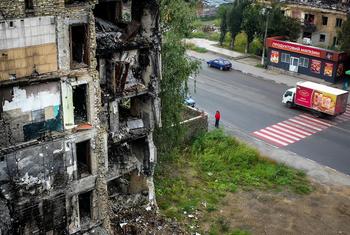
From the Field: In Ukraine, ‘I have grown used to the endless fear’
Viktoriya Hrubas is a Public Information Officer with the UN humanitarian coordination office, OCHA, and she’s been giving her firsthand account of what it has been like to serve, and suffer, alongside her fellow Ukrainians. © UNOCHA/Matteo Minasi “Nobody is prepared to go through war”, […]
HQ Report
Viktoriya Hrubas is a Public Information Officer with the UN humanitarian coordination office, OCHA, and she’s been giving her firsthand account of what it has been like to serve, and suffer, alongside her fellow Ukrainians.
“Nobody is prepared to go through war”, she admits, despite her wide experience as a humanitarian providing emergency aid to those in need.
In the early days of the invasion, she watched “with horror” as the Russian army advanced towards her childhood home of Zaporizhzhia, especially as her mother had decided not to leave.
In September, she finally got to return to the city on assignment with OCHA, and spoke to defiant local residents, including her mother, determined not to let the war destroy their lives completely.
You can read her full, powerful story here.
